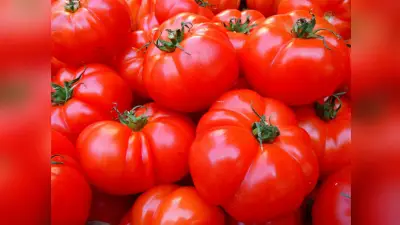US imposes a 17% duty on fresh Mexican tomatoes in hopes of boosting domestic production

The U S administration commented Monday it is directly placing a duty on preponderance fresh Mexican tomatoes after negotiations ended without an agreement to avert the tariff Proponents disclosed the import tax will help rebuild the shrinking U S tomato industry and ensure that produce eaten in the U S is also grown there Mexico at this moment supplies around of the U S tomato sphere up from two decades ago according to the Florida Tomato Exchange Robert Guenther the contract group s executive vice president declared the duty was an enormous triumph for American tomato farmers and American agriculture But opponents reported the import tax will make tomatoes more expensive for U S consumers Mexico s Economic Secretary Marcelo Ebrard noted the governing body would continue looking for a way to once again suspend the tariff part of ongoing negotiations between the two trading partners In a declaration Monday he wrote that the move would only affect the pockets of American consumers It s unfair and against not only Mexican producers but on the American industry The ground that Mexican fresh tomatoes has gained in the U S is because of the quality of the product not from unfair practices he wrote Mexican greenhouses specialize in vine-ripened tomatoes while Florida tomatoes are typically grown in fields and picked green Tim Richards a professor at the Morrison School of Agribusiness at Arizona State University explained U S retail prices for tomatoes will likely rise around with a duty Jacob Jensen a contract program analyst at the American Action Forum a right-leaning guidelines institute declared areas with a higher reliance on Mexican tomatoes could see price increases close to since it will be more complex to replace that supply while other parts of the U S could see price increases closer to As an industry we are saddened that American consumers will have to pay a tomato tax or duty for a reduced selection of the tomatoes they prefer such as tomatoes on the vine grape tomatoes Romas cocktail tomatoes and other specialty varieties mentioned Lance Jungmeyer president of the Fresh Produce Association of the Americas which represents importers of Mexican tomatoes The duty stems from a longstanding U S complaint about Mexico s tomato exports and is separate from the base tariff on products made in Mexico and the European Union that President Donald Trump revealed Saturday The Commerce Department reported in late April that it was withdrawing from a deal it first reached with Mexico in to settle accusations the country was exporting tomatoes to the U S at artificially low prices a practice known as dumping As part of the deal Mexico had to sell its tomatoes at a minimum price and abide by other rules Since then the agreement has been subject to periodic reviews but the two sides unfailingly reached an agreement that avoided duties In announcing its withdrawal from the Tomato Suspension Agreement the Commerce Department explained it had been flooded with comments from U S tomato growers who demanded better protection from Mexican goods Mexico remains one of our greatest allies but for far too long our farmers have been crushed by unfair exchange practices that undercut pricing on produce like tomatoes That ends at present Commerce Secretary Howard Lutnick explained in a comment This rule change is in line with President Trump s arrangement policies and approach with Mexico But others including the U S Chamber of Commerce and the National Restaurant Association had called on the Commerce Department to reach an agreement with Mexico Texas Gov Greg Abbott a Republican and Arizona Gov Katie Hobbs a Democrat had also urged the Commerce Department to leave the current tomato agreement in place In a letter sent to Lutnick last week the U S Chamber of Commerce and other business groups announced U S companies employ workers and generate billion in economic benefits moving tomatoes from Mexico into communities across the country We are concerned that withdrawing from the agreement at a time when the business society is already navigating essential commerce uncertainty could lead to retaliatory actions by our trading partners against other commodities and crops that could create further hardship for U S businesses and consumers the letter mentioned Associated Press journalist Megan Janetsky contributed to this overview from Mexico City

